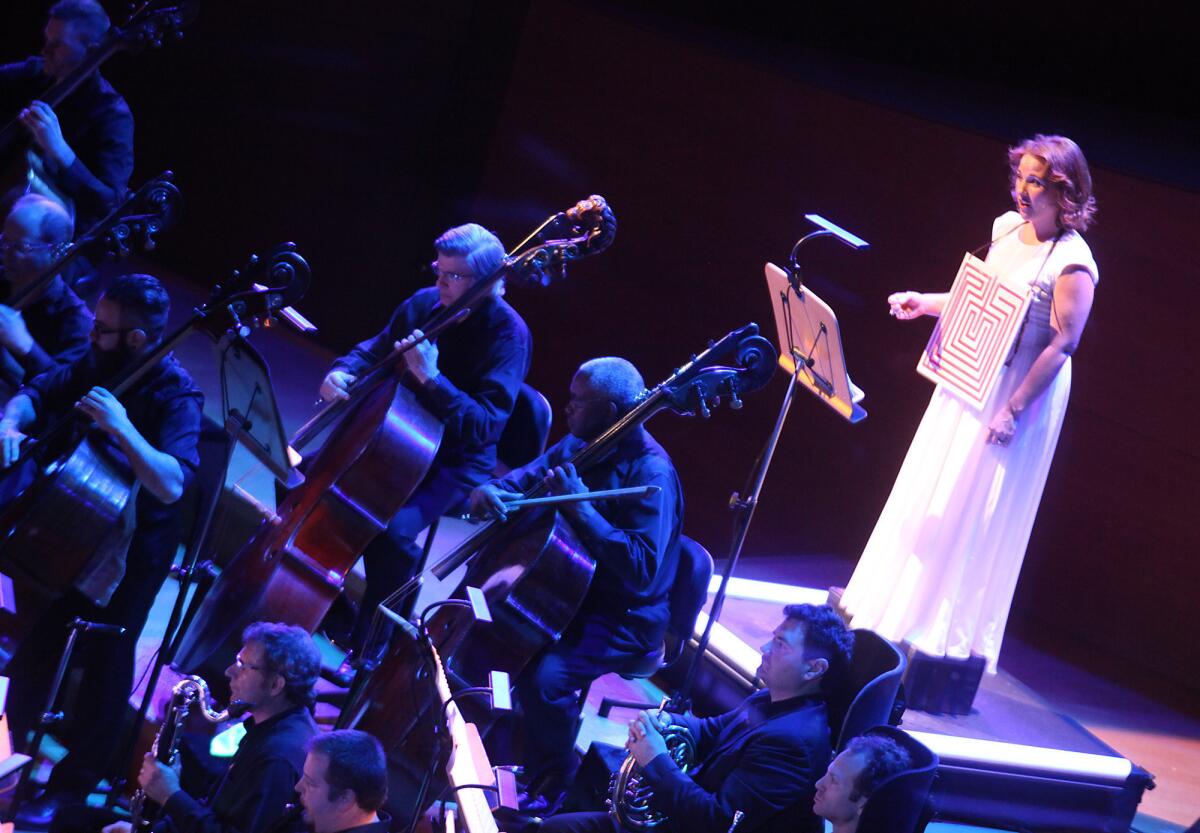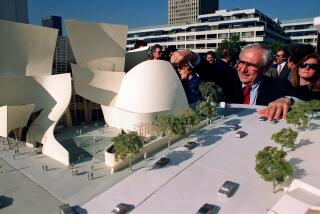Review: Philip Glass portion of ‘CIVIL warS’ rings true at Disney Hall

Los Angeles’ two greatest cultural disappointments of the past three decades may have been the failure of the Olympic Arts Festival in 1984 to mount director Robert Wilson’s eight-hour international operatic epic, “the CIVIL warS” and the Music Center’s inadequate support in 2000 of Frank Gehry’s grand plan to renovate and urbanize the facility and reshape downtown’s civic center in the process.
All, though, is not lost. As part of Minimalist Jukebox on Thursday night, the Los Angeles Philharmonic reunited those two transformative artistic visions by presenting Philip Glass’ contribution to “the CIVIL warS,” known as the Rome section, in Gehry’s successful contribution to the Music Center, Walt Disney Concert Hall.
Wilson’s “CIVIL warS” was of unprecedented ambition. Opera companies in six different cities — Rotterdam, Cologne, Tokyo, Marseilles, Rome and Minneapolis — produced individual works at their expense. Five composers were involved. Famed opera singers and the odd pop star, David Bowie being one, had signed on to what was meant as a multi-faceted construal of civil wars throughout the world.
PHOTOS: Best classical concerts of 2013 | Mark Swed
But Los Angeles flaked out. Our well-endowed city would not fund mounting the whole shebang at the Shrine Auditorium on the eve of the L.A. Olympics. The globe remains pockmarked by civil wars, and the full work has never anywhere been produced.
Glass’ Rome section turned out to be the most operatically intriguing part of the cycle, and the one that has continued to have a life. It directly followed Glass’ unconventional “portraits” operas of Einstein, Gandhi and pharaoh Akhnaten. But for the Rome Opera, Glass embraced operatic tradition for the first time. The more than 20 Glass operas that have followed come out of the innovations of this score.
Only the libretto, a non-narrative mash-up of texts assembled and written by Wilson and Maita di Niscemi, retains Glass’ avant-garde theatrical roots. The piece begins with a prologue in which an Earth Mother and a Snow Owl declaim the ancient Roman playwright Seneca. The civil warriors are Garibaldi in the first scene, Abraham Lincoln and Robert E. Lee in the second.
In the final scene, a skittish young Mrs. Lincoln tells us not to rush, to snap it up, that she’s not nervous but scared to death, that it must have been a terrible war but every day is wonderful. The opera ends with Hercules conquering hell.
PHOTOS: Arts and culture in pictures by The Times
It is a glorious work and had an unforgettable staging by Wilson that included Lee revolving in the porthole of a spaceship, a Lincoln on stilts who looked 25 feet tall and all the surrealism you could ever hope for.
Over Thanksgiving weekend 1984, the L.A. Phil gave the U.S. premiere in the Dorothy Chandler Pavilion, brilliantly lighted and semi-staged by Wilson. It was the first time a major American orchestra had ever played anything by Glass. The performance was pretty good, the atmosphere fabulous. No other major American orchestra has played it.
Thursday night’s performance, conducted by Grant Gershon and featuring his Los Angeles Master Chorale and excellent soloists, gave the work its finest performance. Gershon found rich veins of lyricism, made Glass repetitions flow with the smoothness of sweet honey and conveyed the thrill of the operatic exuberance. The Master Chorale was the chorus of Glass’ dreams. Thirty years ago the L.A. Phil was stalwart but somewhat resistant to Glass’ then unfamiliar style. Thursday it played with tenderness and fervor.
Yet times have changed in unpredictable ways. Neither Glass nor Wilson were this time on hand. Heavy-handed amplification was used in Disney — in the Pavilion only the spoken lines had been amplified — and that added a coarsening of the singers’ sound and a blurring of spoken text (the orchestra was less problematic). There was trick lighting by Trevor Stirlin Burk and trick direction by Tanya Kane-Parry.
PHOTOS: The most fascinating arts stories of 2013
Lincoln was given a top hat and looked foolish. There were effortful attempts at having singers assume Wilson’s slow motion walking: That also looked foolish. Elsewhere Kane-Parry seemed to want to make sense where Wilson had stopped making sense.
Thankfully nothing could diminish the piercing intensity of soprano Hila Plitmann’s Snow Owl or the effusive richness of mezzo-soprano Sasha Cooke’s Earth Mother. Tenor Andrew Staples belted out Garibaldi’s enthusiastic aria athletically and in one bit of effective staging ran around the stage and stood at the organ loft like an orator addressing the chorus. As amplified baritone Craig Verm became an over-booming Lincoln, but bass Steve Pence proved a quietly pensive Hercules. John Schneider and Peabody Southwell captured the essence of the spoken roles of Lee and the young Mrs. Lincoln but had microphones to overcome. The concert repeats Saturday.
The full title of Wilson’s unfinished magnum opus is “the CIVIL warS: a tree is best measured when it is down.” It is an irony that Glass’ Rome section was not best measured, as it might well have been, unadorned in Disney. The lesson of the past 30 years — trust in the true visions of Wilson, Glass and Gehry — is still being digested.
---------------------------
Glass: ‘the CIVIL warS’ (Rome section)
Where: Walt Disney Concert Hall, downtown L.A.
When: 8 p.m. Saturday
Cost: $18-$179
Info: (323) 850-2000 or https://www.laphil.org
Running time: 90 minutes
MORE
PHOTOS: Hollywood stars on stage
CHEAT SHEET: Spring arts preview 2014
PHOTOS: Arts and culture in pictures
More to Read
The biggest entertainment stories
Get our big stories about Hollywood, film, television, music, arts, culture and more right in your inbox as soon as they publish.
You may occasionally receive promotional content from the Los Angeles Times.







